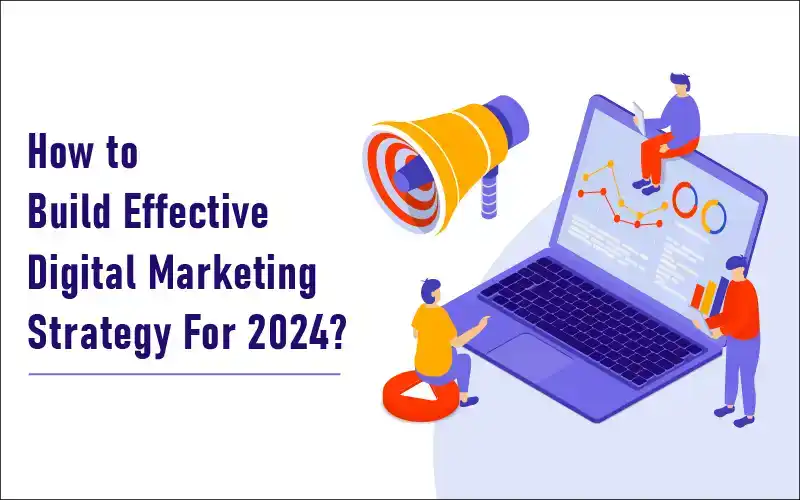As we embark upon the dynamic landscape of 2024, businesses must fortify their digital presence through strategic and innovative marketing initiatives. In today’s hyper-connected world, crafting an effective digital marketing strategy is paramount to achieving sustainable growth and maintaining a competitive edge. In this highly dynamic digital ecosystem, consumer behaviors, and technological advancements reshape the marketing landscape. So, organizations need to adapt and refine their approaches to remain relevant and impactful. Let us discover actionable insights on crafting a robust digital marketing strategy encompassing vital digital marketing services.
What is a Digital Marketing Strategy?
A digital marketing strategy is a comprehensive plan that outlines how a business will utilize various online channels and platforms to achieve its marketing goals and objectives. By utilizing digital technologies, businesses can effectively reach and engage with their target audience, drive brand awareness, generate leads, and ultimately, generate revenue growth.
Why do You Need a Digital Marketing Strategy?
In today’s fast-paced digital landscape, having a well-crafted digital marketing strategy is imperative for businesses seeking to thrive and stay ahead of the competition. A strategic approach to digital marketing enables companies to effectively reach and engage with their target audience across various online channels, fostering brand awareness and loyalty. A well-developed strategy provides a roadmap to optimize marketing efforts and ensure all resources are allocated efficiently and campaigns are executed with precision.
Components of a Digital Marketing Strategy
- Target Audience Identification
- Goal Setting and KPIs
- Content Strategy
- Search Engine Optimization (SEO
- Social Media Marketing
- Paid Advertising
- Email Marketing
Develop targeted email campaigns to nurture leads, retain customers, and promote products or services. For effective campaigns leverage automation and personalization in each email.
- Analytics and Reporting
- Website Optimization and User Experience (UX)
- Conversion Rate Optimization (CRO)
Thorough research to identify and understand the needs of the target audience i.e. demographics, interests, and online behaviors.
Define KPIs, and establish clear and measurable objectives aligned with business goals. Keep track of progress and success achieved through each digital marketing activity.
Develop compelling and relevant content tailored to engage the target audience across various digital channels.
Optimize website content and structure to improve organic visibility and rankings on SERPs.
Create a strong presence on social media platforms engage with followers, and share valuable content to build brand awareness and drive engagement.
Utilize paid advertising channels such as Google Ads, social media ads, and display advertising to reach targeted audiences, drive traffic, and generate leads.
Implement robust analytics tools to track and analyze campaign performance. Collect data analyse it to optimize strategies and drive continuous improvement.
Ensure the website is user-friendly and mobile-responsive, and optimize client conversion. Provide a seamless and engaging experience to visitors.
Continuously test and refine website elements, landing pages, and calls to action to maximize conversion rates for desired results.
Types of Digital Marketing Tactics
Digital marketing tactics strategically employ the following services to maximize engagement and outreach, leveraging the expertise of digital marketers.
- Search Engine Optimization (SEO)
- Pay-Per-Click (PPC) Advertising
- Social Media Marketing
- Content Marketing
- Email Marketing
- Influencer Marketing
- Affiliate Marketing
- Content Syndication
- Video Marketing
- Mobile Marketing
How to Build Your Digital Marketing Strategy for 2024
- Market Research and Analysis
- Set Clear Objectives and KPIs
- Identify Target Audience Segments
- Choose the Right Digital Channels
- Develop a Content Strategy
- Optimize for Mobile and Voice Search
- Invest in Emerging Technologies
- Implement Data-driven Decision Making
- Stay Agile and Flexible
- Continuous Learning and Improvement
Conduct thorough research to understand current market trends, consumer behaviors, and competitor strategies to enhance the digital marketing approach.
Define specific, measurable, achievable, relevant, and time-bound (SMART) goals for digital marketing efforts. Verify the results of each KPI to track progress and success.
Segment audience based on demographics, psychographics, and online behaviors to deliver marketing messages and strategies effectively.
Based on the target audience preferences, industry trends, and marketing objectives select the most appropriate digital channels and platforms. Choose the right options from search engines, social media, email, and content marketing for better reach.
Create a comprehensive content strategy to align with the brand, and business objectives to deliver valuable, relevant, and engaging content. Relevant content across various digital channels attracts and retains an audience.
Considering the increasing prevalence of mobile ensure all digital assets are optimized for mobile devices and voice search.
Explore and invest in emerging technologies such as AI, AR, VR, and blockchain to enhance digital marketing performance, drive innovation, and be on top of the industry.
Monitor and evaluate the performance of digital marketing campaigns through data analytics. Identify areas for improvement, and make data-driven decisions to optimize strategies for maximum impact.
In this digital ecosystem consumer preferences and industry trends, keep on changing. So, remain agile and adaptable to changes. Adjust digital marketing strategy and tactics to seize new opportunities and overcome challenges effectively.
Foster a culture of continuous learning and improvement within the digital marketing team. To drive long-term success stay updated on the latest industry developments, and implement the best practices, and emerging trends to be competitive.
Key Digital Marketing Strategies and Trends for 2024
- Personalization and Customization
- Voice Search Optimization
- Interactive Content Marketing
- Artificial Intelligence (AI) and Machine Learning
- Video Marketing Dominance
- Inclusive and Diverse Marketing
- Privacy and Data Protection Compliance
- Sustainable and Ethical Branding
- Community Building and Engagement
- AR and VR
- Multi-Channel Integration
To enhance engagement and conversion rates use data-driven personalization techniques. Unique marketing messages and content as per individual preferences enhance user experiences.
Voice-enabled search continues to rise. Ensure that relevant elements appear on top of voice search results. For visibility optimize digital content and strategies for voice search queries.
To capture audience attention, and foster two-way communication embrace interactive content formats. To increase engagement use quizzes, polls, surveys, and interactive videos.
To automate marketing processes and analyze vast amounts of data utilize AI and machine learning algorithms. With the help of data, users can predict consumer behavior and deliver personalized experiences.
Capitalize on the growing popularity of video consumption and use video as a primary storytelling medium. Invest in video content creation and distribution across platforms like YouTube, TikTok, and Instagram ruling the internet world.
To represent diverse audiences, cultures, and perspectives authentically include diversity and equity in marketing campaigns. Diverse consumer demographics are a key component to fostering inclusivity and resonating content with the audience.
To gain consumer trust and safeguard sensitive data against breaches and misuse comply with GDPR and CCPA.
To appeal to socially conscious consumers and build brand credibility inculcate ethical business values in marketing communications. Take initiative for CSR, and environmentally sustainable practices.
To build brand loyalty, advocacy, and trust among social media followers foster meaningful interactions. Cultivate online communities, social media groups, and forums to cater interesting content for each group.
For immersive brand experiences experiment with AR and VR technologies. Demonstrate products in virtual environments and engage consumers in interactive storytelling
To facilitate seamless customer journeys, integrate marketing efforts across multiple digital channels and touchpoints. For branding and promotion ensure consistency and coherence in messaging.
Key Take Away
Infiraise crafts pathways to project perfection. Our core value is to innovate, implement, and inspire. From visionary inception to tangible realization, we turn project dreams into concrete success stories. To lay down a perfect digital marketing strategy embrace the power of digital marketing services and working alongside proficient digital marketers can pave the way for sustained growth, heightened brand visibility, and enhanced customer engagement.
FAQs
What is the promotion strategy in 2024?
Top promotion strategies in 2024 will most probably include Search Engine Optimization (SEO), social media marketing, influencer collaborations, content marketing, personalized/behavioral email marketing, and paid search ads. Video content and live streaming will also be increasingly important.
What is the future of digital marketing in 2024?
The future of digital marketing in 2024 involves more automated and AI-driven marketing, customized omnichannel experiences, privacy-focused approaches, and integrated online/offline tactics. Marketing attribution will improve with better data/analytics.
Is digital marketing worth it in 2024?
Yes, digital marketing remains essential and worthwhile in 2024. Digital channels allow for effective targeting, optimization, and measurement. Brands must have a digital presence and strategy to connect with modern audiences and remain competitive. However, a unified digital/traditional approach is ideal.





